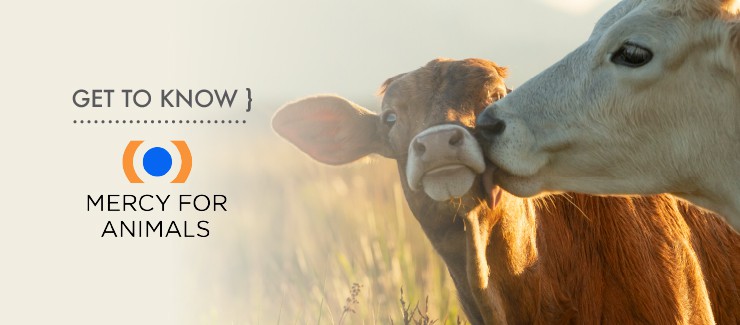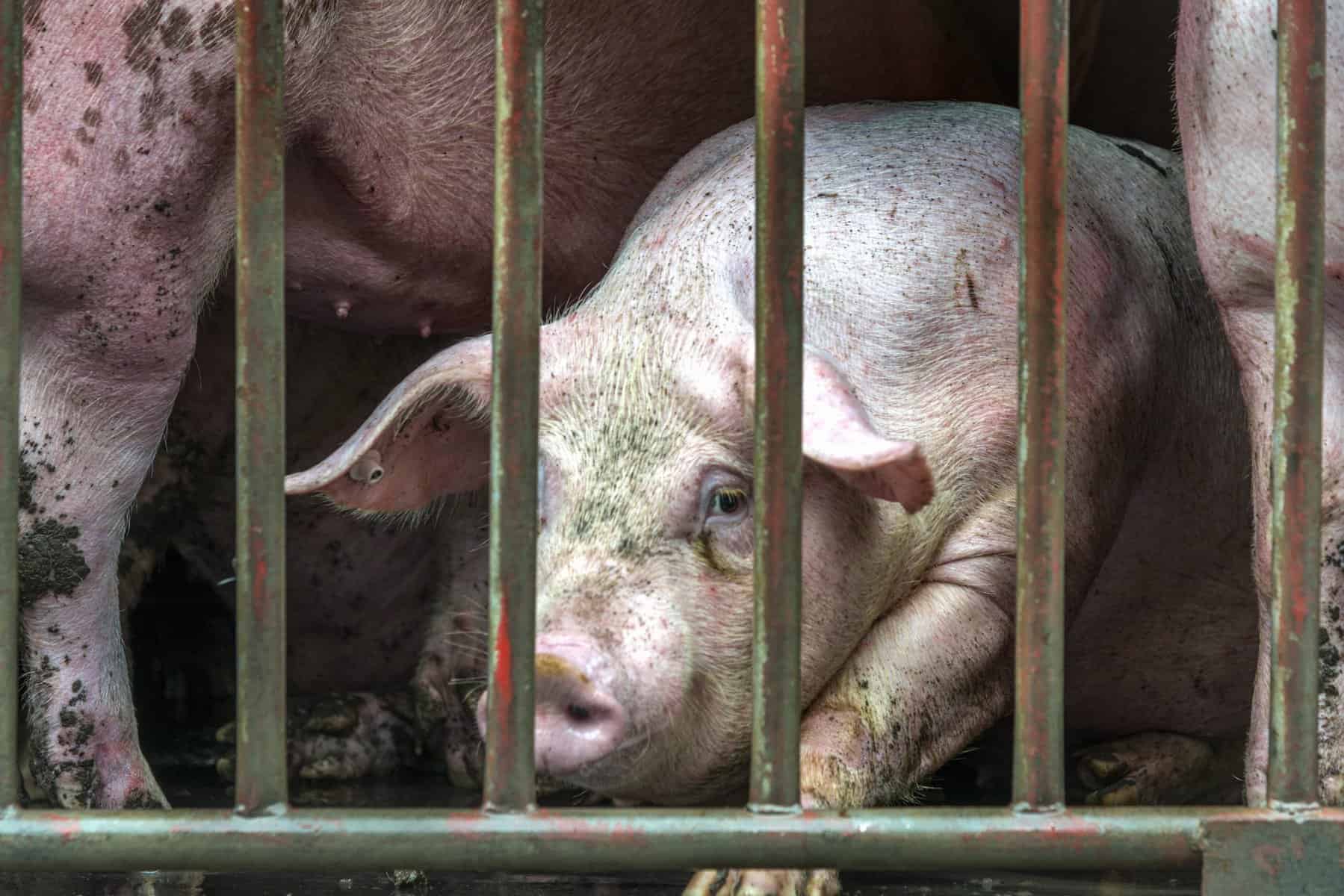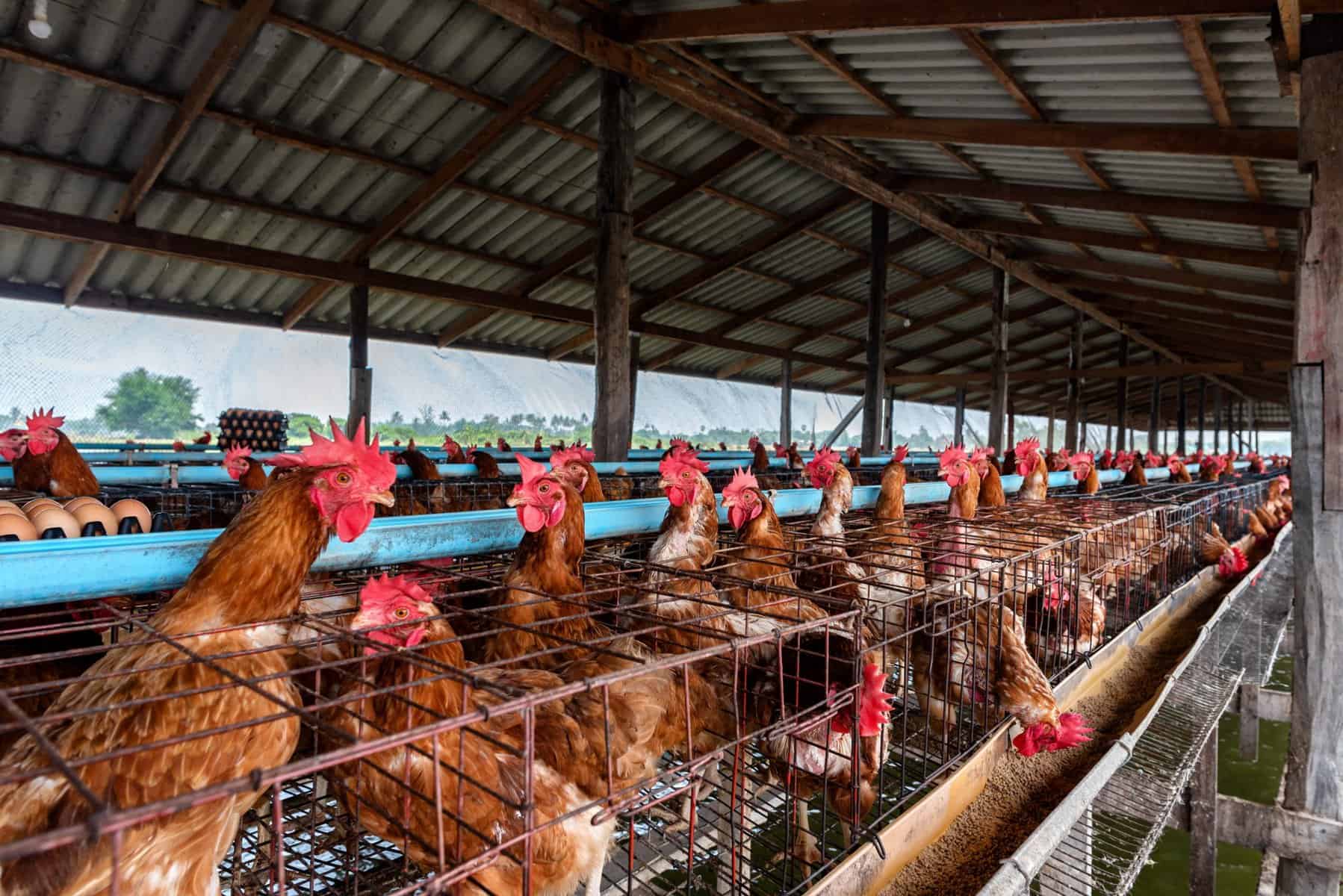
I sat down with Mercy For Animals to discuss what they're doing to make sure that animals are not treated with such devastating cruelty while in our farming systems. Factory farming, also known as CAFOs, often crowd and cage animals in such a way that there's not even enough room to move, turn around, get any sunlight or live in any decent sort of way. They're conditions are miserable and sub-par, and often we turn a blind eye. Yet, we can make a difference if we chose to. Let's actually take a moment to learn more about what is possible from AJ Albrecht, the Managing Director, US & Canada, of this passionate organization.

How did your mission start?
Mercy For Animals was founded when a teenager in rural Ohio, who was destined to become a fifth-generation farmer, heard about a tragic event at his local high school. A teacher there—who was also a pig farmer—brought dead piglets to class for a dissection assignment. To the horror of many students, one piglet was still alive. A student who worked at the teacher’s farm grabbed the squealing piglet and slammed her head first against the floor in a failed attempt to kill her. The incident sent shockwaves through the community. A judge ruled that the action was legal because it was “standard agricultural practice.” Our founder knew he had to do everything possible to end this systemic injustice. Soon after, Mercy For Animals was born.
Mercy For Animals’ mission has evolved in the 25 years since then. Our mission is to end industrial animal agriculture by constructing a just and sustainable food system. Our vision is a world where animals are respected, protected, and free.
Let’s discuss the impact Mercy for Animals is having on farming today. Tell us some of the victories that you have had?
Mercy For Animals’ work can be organized into two broad categories: reducing suffering for the animals who are already in the system and sparing animals from the system entirely. In the first category, we work to get companies to adopt stronger welfare policies for the animals in their supply chains. For example, we’ve collaborated on policies with hundreds of major food companies to ban some of the cruelest factory-farming practices. These include confining laying hens in tiny wire cages, keeping mother pigs in crates so small the animals cannot even turn around, and breeding chickens used for meat to grow monstrously large unnaturally fast—so-called Frankenchickens.
We’ve also seen progress in public policy to reduce animal suffering. To date, 15 states have banned extreme confinement for some farmed animals, and just last year the Supreme Court of the United States upheld one of the first of those laws: California’s Proposition 12, which was passed through ballot initiative in 2018.
In the second category, we work to spare animals a life in the food system altogether by working across corporate and government landscapes to make plant-based food more accessible and affordable. Thanks in large part to our movement’s efforts, more and more retailers are offering plant-based options, and we’re seeing local and state governments begin to shift their food purchasing as well.
And finally, Mercy For Animals’ Transfarmation Project is building collective power sufficient to realize a just and sustainable food system. Transfarmation does this by helping farmers transition from industrial animal agriculture operations to raising crops for human consumption. We are creating models of alternative economic opportunities, building solidarity with other movements, and shifting societal narratives to change culture.

Where are the areas that are hardest to create change? Why do you think so?
Despite the efforts of the farmed animal protection movement and the progress we have made, the truth is that, by the numbers, we are losing: Year over year, meat production is rising. This is because our food system is set up to support meat companies while exploiting other actors in the system. The industry largely externalizes risks and liability, most often to the most vulnerable among us. The damage and harm are borne by farmers, workers, communities, consumers, the environment, and animals, not the corporations and industry leaders that make wonderful profits off some of this harm and by externalizing risks and liabilities. Subsidies are a perfect example of this. The U.S. government, according to one study, spends $38 billion each year to subsidize the meat, egg, and dairy industries, including crop subsidies that benefit industrial animal farming. It spends less than 1% of that ($17 million) each year on subsidies for fruits and vegetables.
Recently, during COVID-19 lockdowns, instead of coming to the aid of farmers and workers, the government took the side of protecting and bolstering Big Ag. President Trump indemnified the industry against responsibility for any illness or death during the pandemic. In April 2020, he released an executive order compelling slaughter plants to stay open. He invoked the Defense Production Act, usually used during wartime to secure the production of essential goods and to protect companies from getting sued for manufacturing faulty products. This is what those of us who seek to reform the system are up against.
What kind of help do you need most from individuals? And, how can we make the most positive impact in helping you? I.e. with our voice, dollars, legislators…. where could we be most effective?
Compared with the multibillion-dollar animal agriculture industry that we oppose, Mercy For Animals—and the farmed animal protection movement as a whole—is tiny. This is truly a David-and-Goliath battle. Our theory of change asserts that we will see a tipping point, a move from industrial animal agriculture when culture shifts so much that eating animals is no longer acceptable. In order to get there, we must promote kinder food choices. The best thing individuals can do is leave animals off their plates. Additionally, we need animal advocates to use their voices and urge decision-makers—in governments and boardrooms—to end the suffering of the billions of animals who are raised and killed for food every year.

I know you’re trying to get legislation passed to help efforts. Describe these efforts and what kind of response are you getting from creating legislative change?
An estimated 10 billion land animals are killed for food in the United States each year, and 99% of these animals are raised in factory farms. Their lives are nothing but pain and suffering. At every step of the process, people and the environment are also harmed for the sake of maximizing corporate profits and externalizing costs. We can do better as a country than the status quo! Mercy For Animals engages federal, state, and local policymakers to demand better living conditions and handling standards for farmed animals; shift the burden of responsibility back onto big agribusiness to start fixing the system it created; advocate support for farmers who want to leave factory farming; and promote policies that increase access to healthy, climate-friendly food.
In Congress, we are working with a broad coalition of organizations to advance legislation like the Industrial Agriculture Accountability Act, a bill that envisions a food system that is safer for workers, more competitive for farmers, less damaging to the planet, and less cruel to farmed animals. It is up to the meat industry to solve the problems it has created, not the American taxpayer. At the state level, we are supporting coalition efforts in Maryland to pass policies that ban the use of battery cages in egg farms. At the city and county levels, we are engaging policymakers on their climate-mitigation plans and ways to reduce carbon emissions by shifting their purchasing toward climate-friendly plant-based foods.
Studies consistently show that the majority of people are against cruelty to animals, including farmed animals. Accordingly, the majority of many policymakers’ constituents also oppose this cruelty. But we continually have to find ways to make our reforms politically feasible and culturally acceptable, because our food system is deeply entrenched in systemic oppression and exploitation.

You’re celebrating your 25th year with a gala in Los Angeles and noticed that you’ve gotten a lot of celebrity involvement. How are these celebrities bringing more awareness to the mission?
We’re very grateful for the tremendous support of over 170 public figures who have kindly joined our 25th anniversary gala celebrity honorary committee. All these inspiring individuals from around the world have lent their names in support of our milestone celebration. Whether spreading the word about our gala or our organization via their social media platforms or attending our celebration in person, we are so grateful that they are shining their spotlights on the issues we address togeth



Any advice to those newcomers to Mercy for Animals and your mission, and to those who become heartbroken when they realize the cruelty that goes on today in farming? I personally just want to cry when I see all that goes on and am also disgusted with our systems. That’s why I wanted to interview you all so that my platform can support you!
Aside from leaving animals off our plates as much as possible, the work to create real, systemic change for farmed animals will require a groundswell of support and mobilizing and organizing people across the country and around the world. That’s why in 2023, Mercy For Animals launched its distributed organizing program in the United States and Canada to help build grassroots power to shift the institutions and systems that exploit animals. The bottom line is that we need people who are moved by this issue, who care about animals, and who want to see change to take action and get involved.
You can get started by visiting the action center on our website and signing up—from there, a staff organizer will be in touch to guide you into taking action and determine the best way for you to contribute to this movement according to your interests and skills.
Any other group that you are passionately advocating for as well?
Mercy For Animals works not only with other farmed animal protection and animal rights groups but across social movements. We cannot do this work alone—we are stronger together. Also, through our award-winning project The People’s Fund, we award grants to BIPOC-led organizations that are building a stronger movement for food-system change. These organizations have been critically under-resourced due to systemic racism, and we know that this inequity prevents ambitious, strategic advocates and organizations from scaling their work; innovating; and achieving impact for animals, communities, and the planet. We need communities on the front lines to bring their uniquely powerful and relevant perspectives to the fight against factory farming. Over the past four years, we have dispersed nearly a million dollars in funding to about 30 activists and organizations. We are deeply passionate about advocating for our community partners and uplifting their vision of a just food system!



Comments